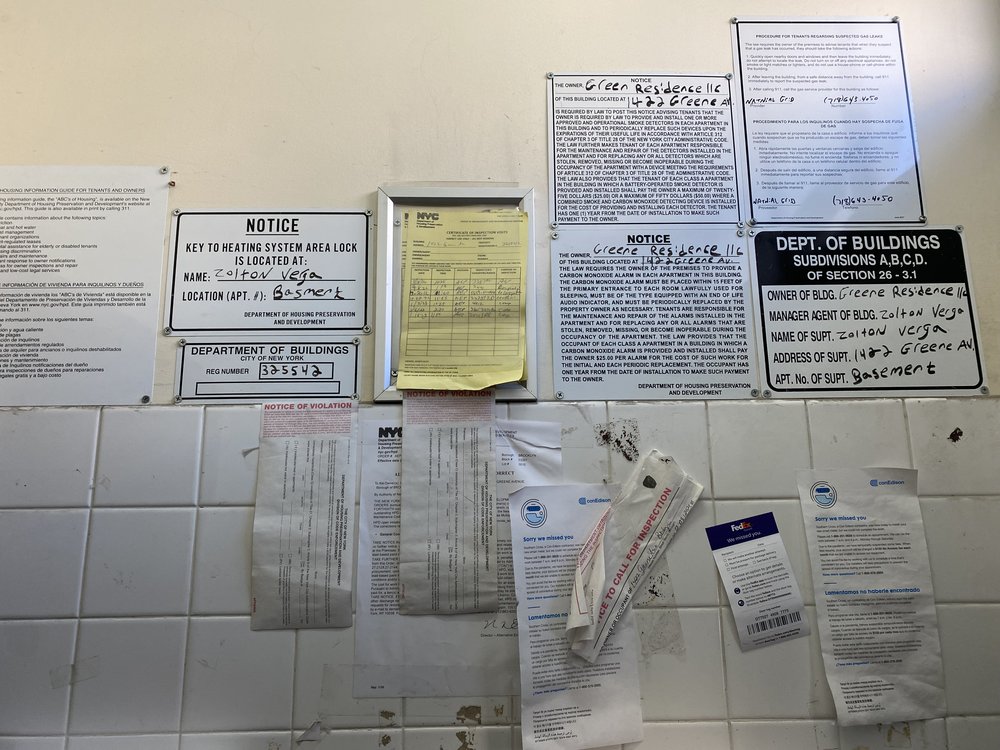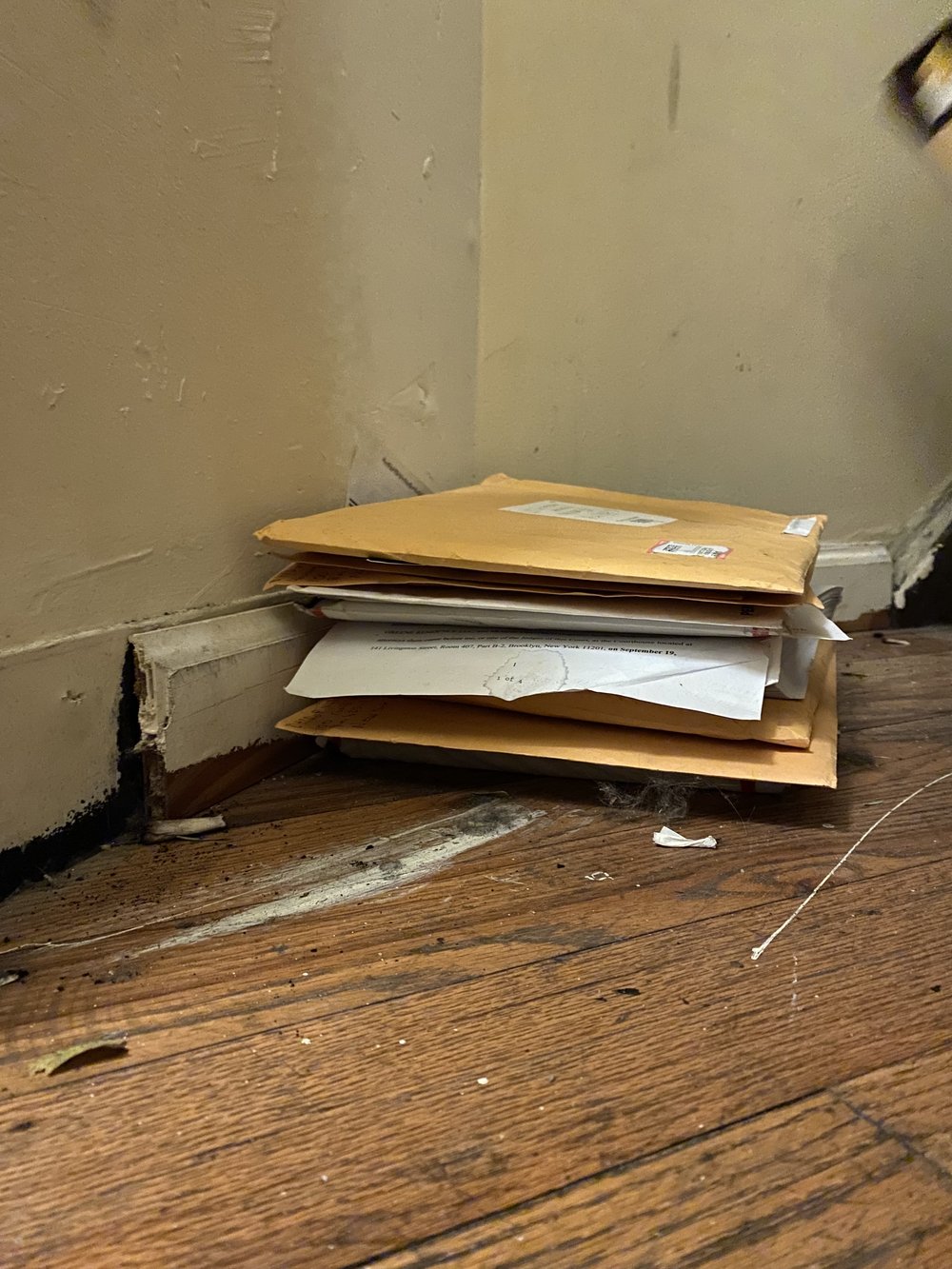In rare occurrence, Brooklyn landlord spends time in jail over apartment violations
Jan. 24, 2023, 5:49 p.m.
Landlord Aron Stark spent about a week at Rikers Island last month for failing to respond to the court over repairs on a Bushwick property.

A Bushwick landlord is getting yet another shot to fix the violations in his six-unit building, a month after a judge took the rare step of sending him to Rikers Island.
A Brooklyn judge ordered property owner Aron Stark’s arrest last month after he failed to complete court-ordered repairs at 1422 Greene Ave as roach infestations, heat and hot water complaints mounted and the city’s housing agency cracked down with steeper fines and heightened scrutiny. He was released eight days later.
At a court appearance on Tuesday, Stark’s attorney asked the court to withdraw from the case. Stark declined to comment outside of the courtroom and left before his case was heard.
HPD inspectors have cited the three-story property near Wyckoff Heights Hospital for issues including roach infestations, heat outages, and inadequate fire protections since 2021. While those conditions are not exactly unusual in properties owned by New York City’s most notorious landlords, few ever face criminal penalties.
Incarceration is an extreme last resort and rarely ever imposed for treatment of tenants, except in cases where the hazards contribute to someone’s death. At other times, owners are jailed as a result of financial crimes.
“A landlord being a tenant of a jail cell isn’t just rare, it’s nearly unheard of,” said Aaron Carr, founder and executive director of the housing watchdog group Housing Rights Initiative.
But what sets Stark’s case apart from the thousands of other landlords with dozens of complaints and violations against them is that he not only ignored his tenants’ needs, he also ghosted the court.
Judges typically give owners numerous opportunities to address problems, so long as they respond to notices and send a representative to court, said Emilio Paesano, a lawyer with the organization Mobilization For Justice who represents the building’s tenants.
“We all have cases where conditions remain uncorrected and yet landlords seem to get out of being punished for that,” Paesano said. “Stark’s repeated defaults and disregard for the court and tenants is a product of the court forgiving landlords and permitting landlord noncompliance with respect to housing standards.”
Stark’s attorney Stephen Feldman declined to comment on the specifics of the case or provide a timeline for repairs. Feldman suggested there was more to the story that could come out in future proceedings.
“In the civil context, the standards for notice are very relaxed,” he said.
But Brooklyn Housing Court Judge Remy Smith found that Stark’s failure to respond to court notices and correct violations was enough to merit jail time — at least temporarily.
Smith ordered Stark held for civil contempt and the city sheriff's office arrested him on Dec. 8. His release eight days later was contingent upon him setting aside money to cover more than $212,000 in fines and begin contracting for repairs.

All told, he owes more than $650,000 in penalties for violations across his building portfolio, court records show. HPD has asked a judge to hold him in contempt for ignoring violations and fines at another property he owns on Hancock Street in Bushwick.
Stark submitted documents showing he wired $75,000 to an escrow account to use to pay for repairs, but HPD records show he still has not filed a motion to release that money or resolved the 74 violations that remain open at the buildings.
As recently as Jan. 20, National Grid was set to terminate gas service at the building because Stark owed $17,000 in unpaid bills. Paesano said he and HPD intervened to get a service extension.
On Tuesday, Smith said Stark had to sign an agreement with a management company so she could release some of the money from escrow.
“The reason I put that $75,000 in there was to start work getting done,” she said. “But I actually need to see a paper trail.”
Inside the building lobby, behind a dingy front door, housing inspectors have posted several notices for code violations. On Tuesday, tenants pointed to a stack of documents and court summonses meant for Stark, which remained unopened in the hallway. Other photos and videos they shared showed water pouring out of ceiling fixtures and into their kitchens, as well as mounds of clutter inside an illegal basement apartment, including stacks of paper on a stove burner.
The building's tenant association, which sued Stark for repairs, said the problems persist despite the lengthy legal action and city oversight.
“It’s been disappointing that after years of collective action, patience, and even reluctantly engaging law enforcement to compel Aron Stark to address unrepaired conditions and harassment in court, he continues to neglect his responsibilities as a landlord,” the tenant association said in a statement.
The eight-day jail stint was the latest twist in a long legal saga for Stark, who was sentenced to 14 months in federal prison after pleading guilty to Medicaid and food stamp fraud in 2019. He’s faced various lawsuits seeking repairs at his Brooklyn buildings — including five cases of active litigation.
For years, Stark’s tenants have complained about the crumbling conditions in his buildings, as well as what they consider intimidation tactics and bizarre behavior, like barging into their apartments and looking in the fridge.
As Gothamist previously reported, residents of 1422 Greene Ave went on a rent strike in the early days of the pandemic to try to compel repairs. In February 2021, HPD added the building to its Alternative Enforcement Program, which imposes steeper fines on landlords who fail to resolve serious violations in their buildings.
More than a year later, 46 of the violations remain open, including 21 for immediately hazardous conditions, such as roach infestations and a lack of heat and hot water in some apartments. Stark and building manager Moshe Deutsch owe HPD a combined $650,000 in civil penalties, court records show.
Deutsch, who has been included on the Public Advocate’s Worst Landlord List on multiple occasions, filed motions to remove himself from the lawsuits brought by HPD and the building tenants. An attorney for Deutsch did not respond to messages left at his office.
HPD Commissioner Adolfo Carrión Jr. said the strict enforcement and pursuit of criminal penalties should serve as a warning to property owners who neglect or harass their renters.
“Landlords have a legal responsibility to uphold safe housing conditions for their tenants,” Carrión said. “Providing heat, hot water and pest management is not optional – it’s the law.”
But repair delays remain common, even at buildings facing enhanced scrutiny from HPD.
There are 549 buildings in HPD’s Alternative Enforcement Program, city records show, and about 10% of those properties have cycled through the program more than once over the past 15 years, according to an analysis by Councilmember Pierina Sanchez, the housing committee chair.
Sanchez shared the findings at a December Council hearing and questioned why the city continues to serve as “handyman” for negligent owners through the AEP and its Emergency Repair Program, where the city completes repairs and charges the owner — often recouping pennies on the dollar for fines, a 2016 report from the city comptroller found.
Carr, the housing rights watchdog, said the threat of jail time, or at least stricter penalties, could spur negligent owners to shape up.
“One way the courts can and should incentivize landlords to follow the law is by cracking down on landlords who recklessly break the law,” Carr said.
Correction: A previous version of this story misstated the reason behind Stark's arrest. it was for civil contempt.